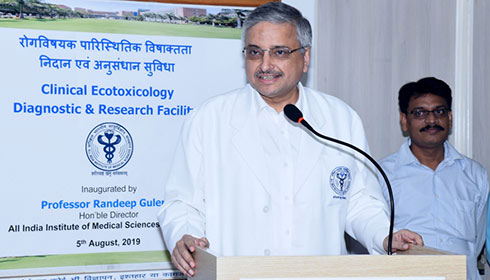
AIIMS-Delhi starts India's first Ecotoxicology diagnostics
Rohit Shishodia
The All India Institute of Medical Sciences (AIIMS), Delhi, has started India’s first Clinical Ecotoxicology Diagnostic and Research Facility to detect, identify and quantify various toxins in patients having diseases resulting from exposure to the environmental toxins contaminating water, food and air.
The facility is ready for testing all body fluids. However, for screening patients for toxic exposure, only blood and urine specimens need to be tested.
Inaugurating the facility, Prof Randeep Guleria, Director, Delhi-AIIMS, said that this facility would be the nodal point for leading research in clinical ecotoxicology in the country.
“Setting up of this facility is remarkable and will serve the patient and nation. Environmental conditions have changed over the period of time. The air, water and soil are getting contaminated due to various anthropogenic activities and the changes are directly affecting health,” added Prof Guleria.
Prof Guleria explained that there is an urgent need to understand how the environmental exposure to toxins affects health. “This facility is very much needed at this point of time and will be the centerpoint of ecotoxicology research in India and the on-going and future research projects at this centre. This will answer various unanswered cause and effects relation of various diseases,” added the AIIMS director.
Prof A Shariff from the Department of Anatomy, Delhi-AIIMS, said that early identification of toxic elements exposure (by the quantification of elements in blood and urine of the patients) will be helpful in giving targeted therapy to the patients.
Prof Shariff added that detection and diagnosis of all organic volatile and non-volatile toxins including pesticides and other poisons will be started in the near future.
According to AIIMS, some Indian states are endemic for arsenic, mercury, lead, cadmium, fluoride, uranium, iron and other toxic elements due to contamination of underground water.
Chronic exposure to these elements leads to different diseases, including chronic kidney disease, cancers, cardiac diseases, hypertension, congenital defects, arthritis, epilepsy, autism spectrum disorder and Parkinson’s disease.